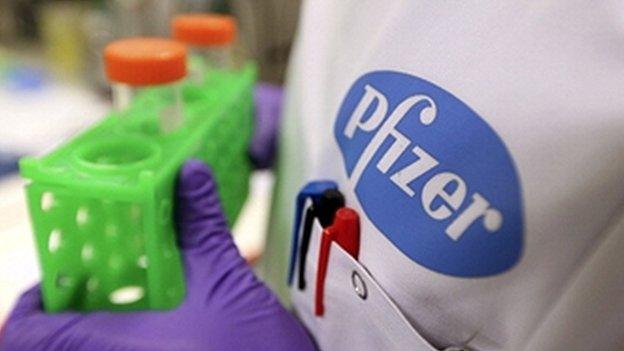China could challenge the Pfizer deal
- Published

At present Pfizer and AstraZeneca hold the number one and two spots in the Chinese drugs market, accounting for over 15% of the market.
Ian Read, the chief executive of Pfizer, carries a coin in his pocket. About the size and weight of a £2 piece, on one side it urges "straight talk" while on the other are embossed the words "own it". The coin is available to all Pfizer's staff and is part of the "culture" Mr Read, a Scot, wants to see in his business.
Whether he flashed the coin during his discussions with the UK government over the possibility of Pfizer buying AstraZeneca is unknown, at least to me. But what is certainly true is that he doesn't quite "own" the deal - ministers will make sure of that - and however much "straight talk" he engages in, many will think he is spinning a line.
Two elements have now come into sharp focus. One is the government's attitude to the deal, which according to two very senior figures in Whitehall is warming up rapidly.
The other is China - which will be keeping a watchful eye on events in the City involving two drugs companies that occupy positions one and two in the Chinese pharmaceuticals market.
First, the government. One senior figure I spoke to today made a passionate defence of Britain remaining an "open country" i.e open to foreign takeovers and, hopefully, foreign investment. Listing Cisco, GE Healthcare and IBM as large American corporates that have brought jobs to the UK, the person said that calls for greater powers for governments to intervene should be treated very warily unless there was a truly "asymmetric" relationship - for example a closed economy attempting to buy up UK intellectual property with no reciprocal arrangements. Russia and China are names that spring to mind.
"Would anyone seriously say now that the Indian takeover of Jaguar Land Rover has been bad for the British economy and British jobs?" the person, who is very close to the Prime Minister, said with a degree of incredulity.
Another person in government who is intimately involved has also been waxing lyrical about how the deal could actually be a shot in the arm for the UK's life sciences sector. With patent box incentives to be exploited (products invented here receive preferential tax treatment) and corporation tax levels lower than in the US, the person said that any deal would be trumpeted as a vindication of the government's policies.
Mr Read has clearly been telling ministers that Britain is an attractive place for Pfizer. I am sure he would consider a secondary listing in London if that eased political concerns. The business has already committed to domiciling in the UK.
Mr Read will give no guarantees, as until he has seen AstraZeneca's books Pfizer will not know precisely what they are taking over. Mr Read does not want to "do an Irene" - a reference to the chief executive of Kraft, Irene Rosenfeld, who made a promise on UK jobs during the takeover of Cadbury that she could not honour.
The maximum pledge Mr Read appears to feel comfortable with is that there will be no net loss of jobs and that Pfizer post-deal will employ the same number of people in the UK as Pfizer and AstraZeneca together employ at the moment - just over 10,000 people. I am sure he will leave a suggestion in the air that it could be far higher and that further investment will follow. Pfizer will also point out that AstraZeneca is already cutting jobs in the UK.
AstraZeneca will be robust in its defence - I am sure refusing to talk unless the offer ticks up towards £50 a share or more. I am told the board is resolute that they do not need rescuing by an American business, however deep its pockets. It has been suggested that in 18 months' time, AstraZeneca's share price could be above £50 in any case without the need for the disruption any takeover entails. Shareholders are not always convinced, of course, by the case for "jam tomorrow".
Then there is China. At present Pfizer and AstraZeneca hold the number one and two spots in the Chinese drugs market, accounting for over 15% of the market. If the two come together, China is certain to investigate, possibly putting up major hurdles to any deal. Don't forget, the Chinese regulators successfully blocked the merger of Glencore and Xstrata for 15 months. In the end its pound of flesh constituted Glencore's sale of a copper mine in Peru for £3.5bn.
Straight talk or not, Mr Read knows that there is still a long way to go to get this deal over the line.